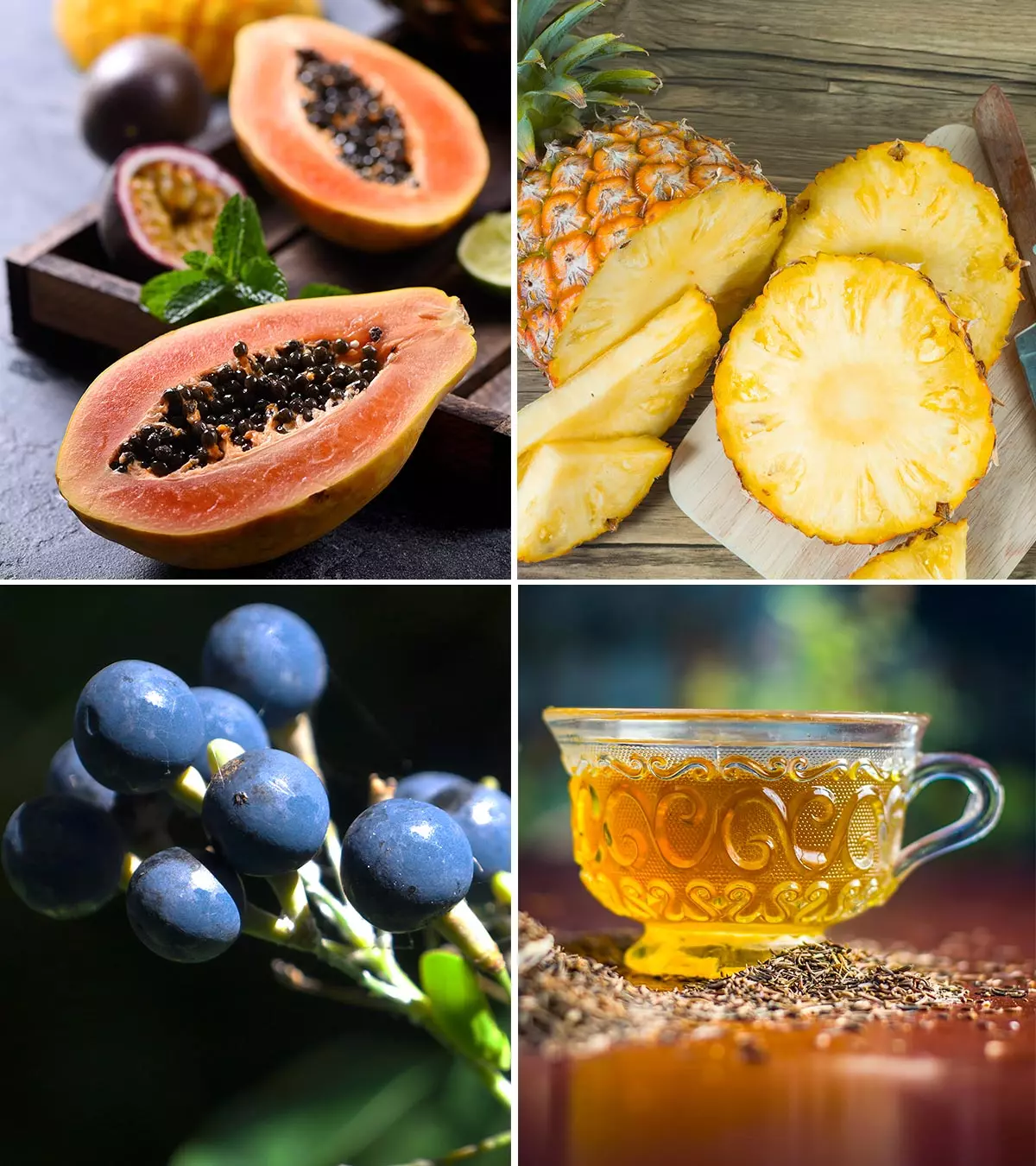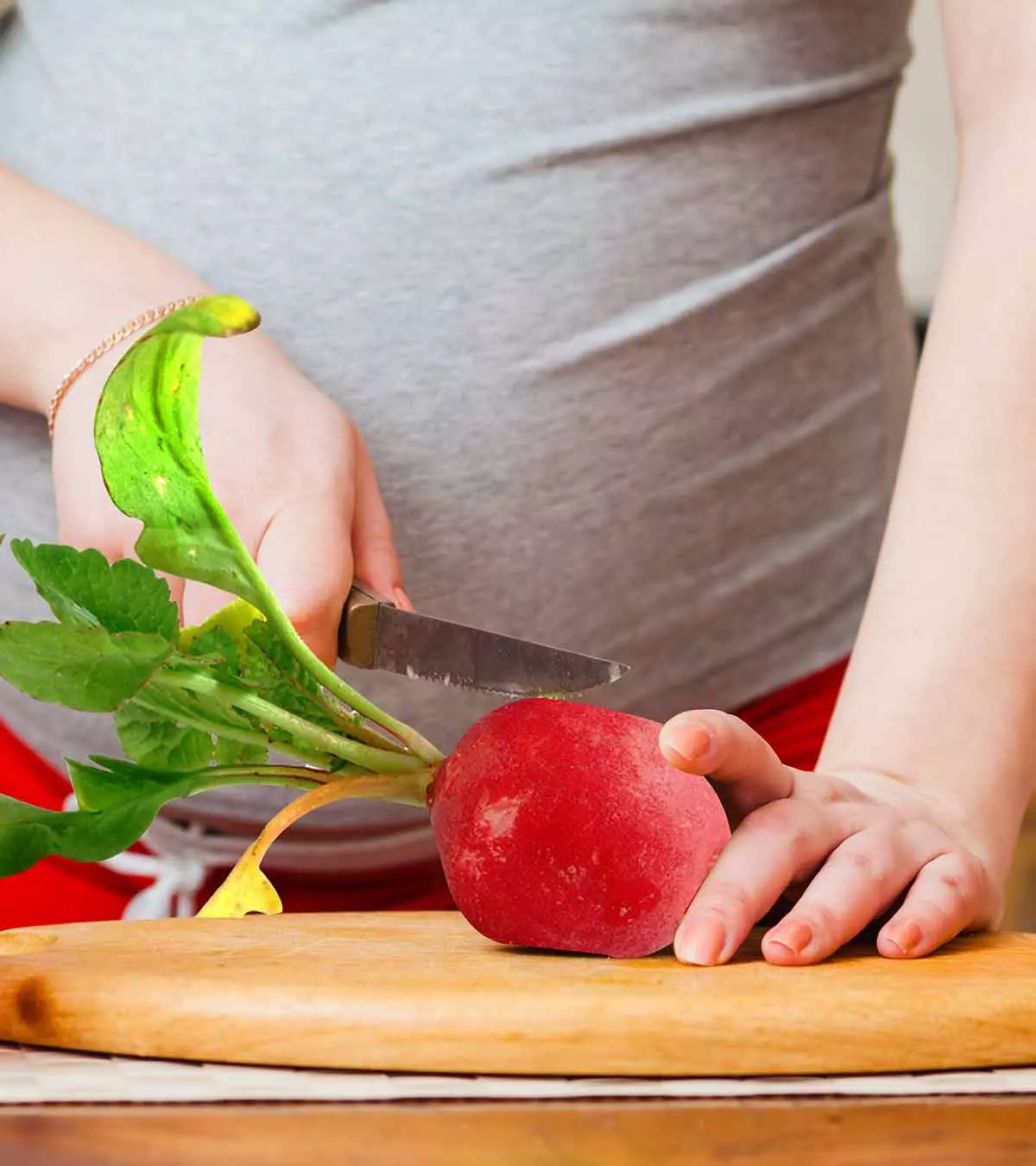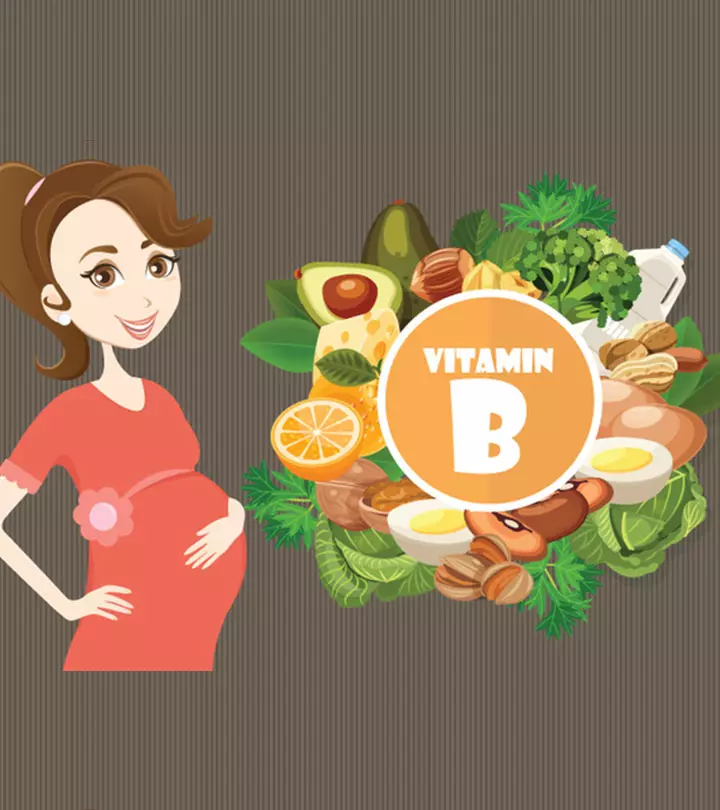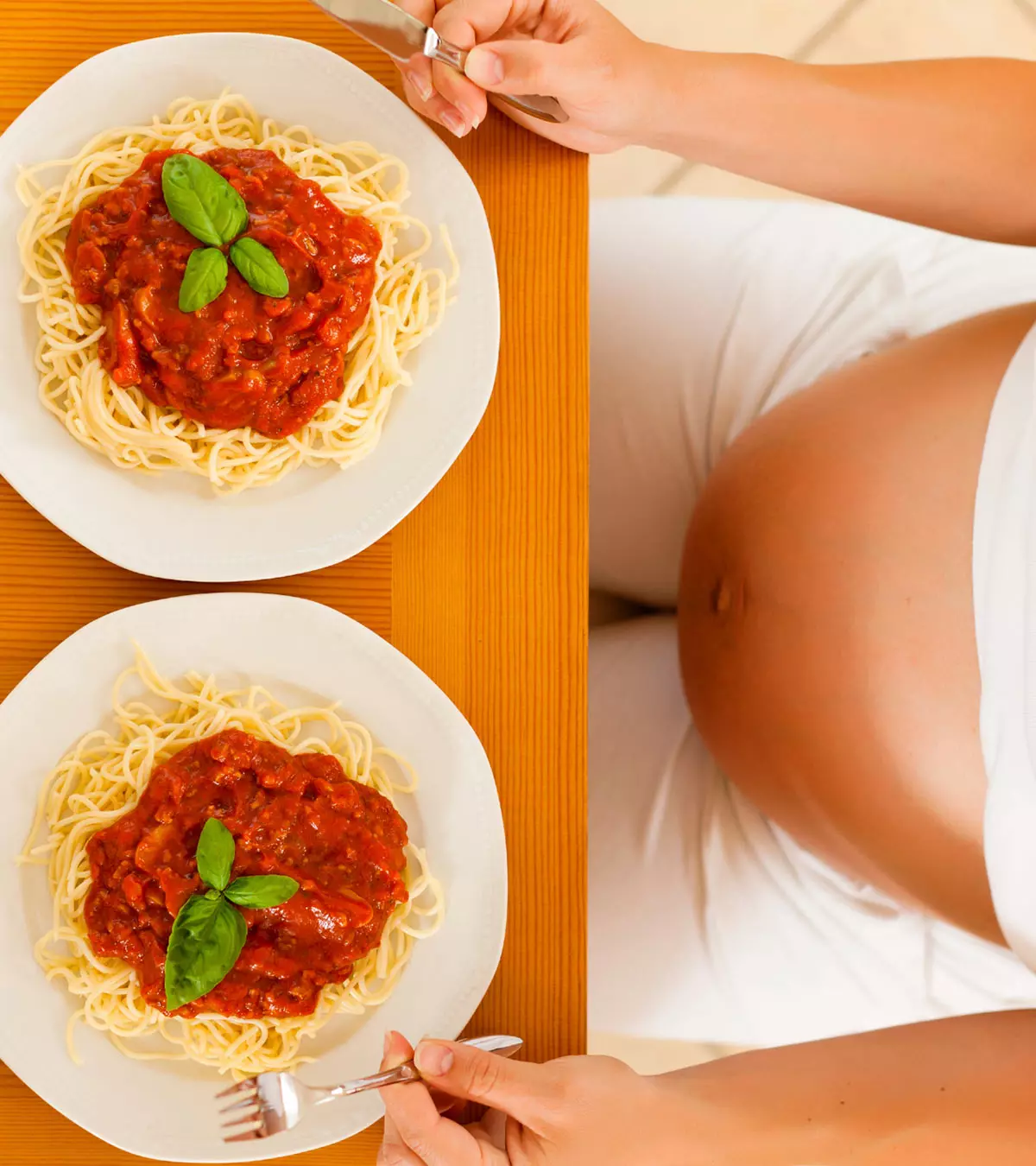
Image: iStock
Persimmon is a nutritious and healthy fruit primarily grown in parts of Asia. Persimmons during pregnancy can provide you with the required nutrition while satisfying your taste buds with their sweetness. Pregnancy is all about eating healthy, and this fruit imparts several health benefits, especially to pregnant women when consumed in adequate amounts.
Read on to know more about the fruit and its benefits during pregnancy.
Key Pointers
- Persimmons are rich in vitamins A, C, B6, manganese, potassium, antioxidants, and fiber.
- The tasty fruits also help prevent anemia, improve immunity, regulate blood pressure, and treat kidney stones and insomnia.
- They are beneficial for the optimum growth and development of the fetus.
- Persimmons are recommended for pregnant women in moderation and fully ripe form.
- However, eating too many persimmons can cause digestive issues in pregnant women.
What Is A Persimmon?
Persimmon, also popular as ‘Nature’s Candy’ and ‘The Fruit of the Gods’, is an orange tomato-shaped fruit with a waxy texture. The delicious fruit belongs to the family Diospyros and is native to China. Several varieties of the fruit exist and are grown in various Southeast and East Asian countries. The fruit’s flavor could vary depending on the variety, with some expressing sweetness while a few having a predominantly tarty taste. Whether you prefer to eat them fresh, raw, cooked, or dried, persimmons can be a satisfying option when dealing with pregnancy cravings. The sweet and pulpy fruit is highly nutritious and beneficial for your health during pregnancy (1).
Is It Safe To Eat Persimmon During Pregnancy?

Yes, you can enjoy eating persimmons during pregnancy. However, you need to have adequate amounts. Eating the fruit helps ensure a healthy pregnancy by providing ample maternal nutrition, making persimmon one of the best fruits to eat during pregnancy. The nutritional content in persimmons could promote the growth and development of your fetus and ensure the good health of the expecting mother. Have a word with your doctor before including the fruit in your regular diet during pregnancy.
 Quick tip
Quick tipHealth Benefits Of Eating Persimmons During Pregnancy
Persimmons contain high amounts of vital nutrients, offering several maternal health benefits when consumed while expecting.
1. Promotes Fetal Growth:
Persimmons are a good source of calcium and phosphorus. So, consuming persimmon fruit during pregnancy can support fetal development and contribute to the growth of your unborn baby’s bones.Also, the fruit promotes the smooth functioning of the central nervous system (2).
2. Cures Anemia:
Iron content in persimmons helps prevent the risk of anemia during pregnancy. Eating fruit during pregnancy and incorporating a variety of fruits into your pregnancy diet helps boost your hemoglobin count and prevents the adverse effects of anemia, such as fatigue and dizziness.
3. Boost Immunity:
Eating persimmons during pregnancy helps strengthen your immune system substantially.
Vitamin A and caroteneiA pigment found in plants that gives them their color content in the fruit helps strengthen your eyesight and heart muscles and promotes the smooth functioning of body processes. Also, vitamin C content in the fruit enhances your immunity substantially.
 Quick fact
Quick fact4. Regulates Blood Pressure:

Persimmons can be effective in treating hypertension during pregnancy. The magnesium content in the fruit could help lower your blood pressure while you are expecting (3).
5. Treats Kidney Stones:
According to the American Urology Association, kidney stones affect about one in an estimated 1500-3000 pregnancies. Although the prevalence rate is not that high, consuming magnesium-rich persimmons can help keep the risk of kidney stones at bay. Eating the fruit can ensure the good health of your kidneys.
6. Fights Insomnia And Stress:
Vitamin C and antioxidantsiSubstances that may prevent or slow down some types of cell damage in persimmons can help strengthen immunity and minimize the effects of stress, anxiety, depression, and insomnia (4).
7. Alleviates Cold And Hiccups:
Persimmon is popular as a traditional medicine to fight cold. The fruit might also help relieve hiccups and their adverse effects during pregnancy (5).
8. Prevents Cancer:
Persimmons contain compounds, such as betuliniciAn acid found in various plants that have anticancer or antitumor properties acid and shibuoliA compound found in plants and certain foods that causes dry mouth while eating persimmons , which offer you anti-cancer benefits. Eating the fruit during pregnancy protects you from the risk of development of cancer. (Click to Tweet!)
9. Detox:
Persimmon is an excellent source of powerful antioxidants, which help detox your body and liver during pregnancy. Also, the antioxidant content of the fruit helps neutralize the free radicals in your body and protect you and your fetus from cell damage effectively during gestation.
10. Good Cardiovascular System:

Persimmon contains fiber and antioxidants, such as beta-carotene that can lower the risk of heart diseases. Thus, consuming persimmon as a part of a well-balanced diet can be a good choice to maintain cardiovascular health during pregnancy (4).
11. Improves Digestion:
Persimmon has a high fiber content, which can help support digestive health and prevent constipation, which is common during pregnancy (2).
Frequently Asked Questions
1. Is persimmon good for fertility?
Yes. Persimmon is rich in vitamin C, which is known to increase fertility. Hence, eating persimmons may help you get pregnant (6) (7).
2. Are unripe persimmons poisonous?
No. Although unripe persimmons have a bitter taste due to high tannin levels, they are not poisonous and can be consumed (8). However, it is best to avoid or limit the intake of unripe persimmons as they may cause digestive issues.
3. What are the side effects of eating persimmons?
When consumed in moderation, persimmon has no severe side effects. However, certain people may experience allergic symptoms such as abdominal cramping, nausea, vomiting, and pyrexiaiA fever over 100° F (37.8° C). . If consumed in excess, it may also cause persimmon bezoariA concrement of partially digested, undigested, or foreign material in the gastrointestinal tract (9). Therefore, consume this fruit in moderation, especially during pregnancy.
4. How many persimmons can I eat a day?
You can eat one persimmon a day because even in such a small serving, persimmon offers around 6g of fiber and 55% of the recommended dietary allowance (RDA) of vitamin A (10).
5. Will eating persimmon lead to constipation in pregnant women?
No, consuming persimmon in moderation may not cause constipation or any other related pregnancy complications. However, if you eat more than the required amount of persimmons, it may cause persimmon bezoar, a ball of fiber, skin, or seeds, to be trapped in your gastrointestinal system, which in turn may lead to constipation (11).
6. Can pregnant women eat frozen persimmons?
You can, but avoid frozen persimmons that have added sugar to maintain a healthy maternal diet (12).
Persimmon is a delicious fruit rich in minerals, vitamins, and bioactiveiA chemical found in small amounts in plants and certain foods that promote good health compounds. Eating persimmon during pregnancy is safe and can offer several health benefits. For example, it promotes fetal growth and regulates blood pressure levels. Further, making this fruit a part of your balanced diet can help you meet your nutritional requirements. However, avoid overconsumption of persimmon. You can eat persimmon as is or add it to other dishes, such as persimmon salad, smoothies, risotto, and bread, to relish during pregnancy.
Infographic: Tips To Consume Persimmons During Pregnancy
Persimmons are filled with nutrients, minerals, vitamins, and antioxidants. Their sweet flavor makes them a prominent part of desserts and baked goods. But you must follow certain rules to reap their benefits while eating it when pregnant. Read the infographic below to learn how to buy, store, and eat this tasty fruit during pregnancy.

Illustration: Momjunction Design Team
Illustration: Is It Safe To Eat Persimmon During Pregnancy?
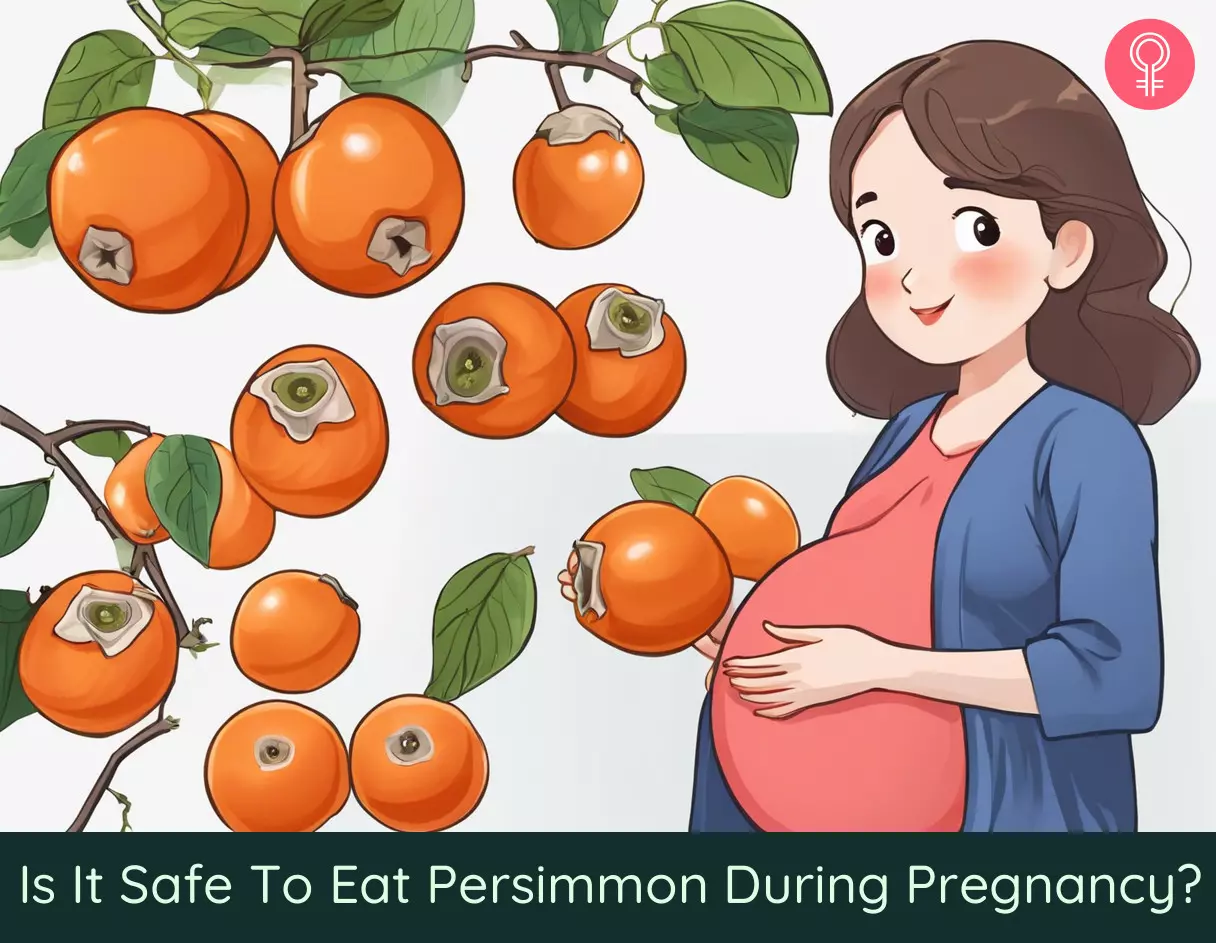
Image: Stable Diffusion/MomJunction Design Team
References
- Sepideh Hosseininejad et.al.; (2022); Valorization of Persimmon Fruit Through the Development of New Food Products.
https://www.frontiersin.org/journals/food-science-and-technology/articles/10.3389/frfst.2022.914952/full - Jyoti Pachisia; (2020); Persimmon (Diospyros kaki): Apple of the Orient: A Review.
https://www.ijhsr.org/IJHSR_Vol.10_Issue.3_March2020/20.pdf - Masood Sadiq Butt et. al; (2015); Persimmon (Diospyros kaki) fruit: hidden phytochemicals and health claims.
https://www.ncbi.nlm.nih.gov/pmc/articles/PMC4817420/ - Persimmons pack plenty of nutritional punch.
https://www.heart.org/en/news/2020/10/19/persimmons-pack-plenty-of-nutritional-punch - Jieun Choi. et. al.; (2019); Anti-inflammatory activities of astringent persimmons (Diospyros kaki Thunb.) stalks of various cultivar types based on the stages of maturity in the Gyeongnam province.
https://bmccomplementmedtherapies.biomedcentral.com/articles/10.1186/s12906-019-2659-5 - I Crha et al.; (2003); Ascorbic acid and infertility treatment.
https://pubmed.ncbi.nlm.nih.gov/12884545/ - M.Del Bubba et al.; (2009); Changes in tannins ascorbic acid and sugar content in astringent persimmons during on-tree growth and ripening and in response to different postharvest treatments.
https://www.sciencedirect.com/science/article/abs/pii/S0889157509001252 - Persimmon.
https://extension.purdue.edu/foodlink/food.php?food=persimmon - P A Dolan and B W Thompson; (1979); Management of persimmon bezoars (diospyrobezoars).
https://pubmed.ncbi.nlm.nih.gov/515761/ - Persimmons pack plenty of nutritional punch.
https://www.heart.org/en/news/2020/10/19/persimmons-pack-plenty-of-nutritional-punch - Health benefits of persimmons
https://www.canr.msu.edu/news/health_benefits_of_persimmons - Fengbo Tan et. al.; (2019): An unusual case of gastric outlet obstruction caused by multiple giant persimmon phytobezoars.
https://academic.oup.com/gastro/article/7/1/74/2726326 - 13 Best Fruits During Pregnancy That You Must Take Regularly.
https://en.choicesinchildbirth.org/best-fruits-during-pregnancy/
Community Experiences
Join the conversation and become a part of our nurturing community! Share your stories, experiences, and insights to connect with fellow parents.
Read full bio of Dr. Neharika Malhotra
Read full bio of Ria Saha
Read full bio of Swati Patwal
Read full bio of Lorraine Teron











